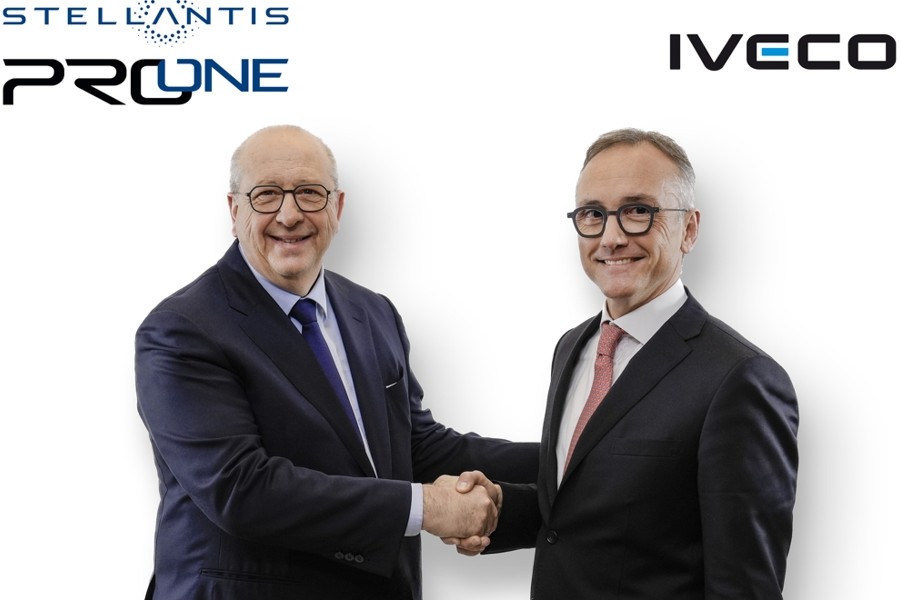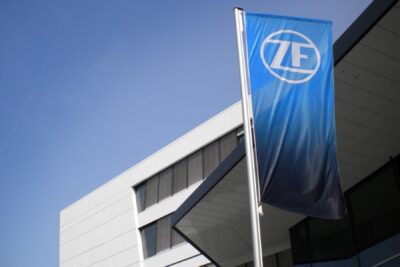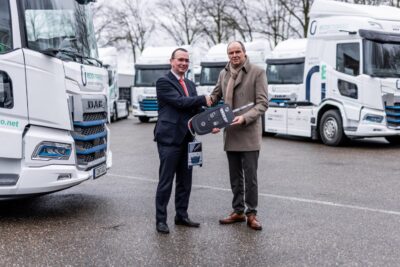Iveco announces two electric transporters with Stellantis technology for 2026
The recently signed cooperation between Iveco and Stellantis provides for the marketing of two fully electric vans, which will be produced by Stellantis and sold by Iveco under the Iveco brand. The Italian commercial vehicle manufacturer is thus expanding its range to four electric vans, as its own eDaily and the eMoovy e-chassis launched with Hyundai are already in the range. The market launch of the newly announced duo is planned for mid-2026. Stellantis Pro One, the car manufacturer’s commercial vehicle division, will act as the contractual partner. The vans will be manufactured at their plants in Atessa (Italy), Gliwice (Poland) and Hordain (France). The Iveco Group states that it will subsequently market the vehicles via its established sales and service channels in the European market, including the UK.
The characteristics of the new electric transporter vans are said to include a gross vehicle weight of 2.8 to 3.1 or 3.5 to 4.25 tonnes. Together with the information that the vehicles will be based on the Stellantis platform for medium-sized and large transports, it is clear that a medium-sized Iveco sister to the Opel/Vauxhall Vivaro, Citroën Jumpy, Fiat Scudo and Peugeot Expert quartet and an analogue Iveco counterpart to the large Fiat Ducato, Opel Movano, Citroën Jumper and Peugeot Boxer vans will be born here. Added to this are the similar Toyotas, which are also based on a collaboration with Stellantis.
Although drive data for the two new electric vans under the Iveco banner are not mentioned, they can be derived from the many sister models if there is no update by mid-2026. The familiar medium-sized Stellantis vans have an output of 100 kW and a battery capacity of 50 or 75 kWh. The range has been 350 kilometres since a revision in autumn 2023. In the large Stellantis-based vans, 200 kW of power is available, and the 110 kWh battery provides 420 kilometres according to the WLTP standard.
In the Iveco range, the duo will “extend it into this lighter weight segment,” as stated in an accompanying press release. To compare, the eDaily has a gross vehicle weight of 3.5 to 7.2 tonnes, while the eMoovy has a gross vehicle weight of 3.5 tonnes on its data sheet, although this model is only available as an electric chassis. The latter was presented at the IAA Transportation trade show last September. The Hyundai offshoot with an Iveco body is based on a platform variant of the E-GMP, is said to be equipped with 800-volt architecture and has a range of 320 kilometres.
But back to the Stellantis-Iveco alliance: Both partners intend to initiate marketing efforts for the new models in mid-2026 and maintain their cooperation over a ten-year period. Luca Sra, President of the Truck Business Unit at the Iveco Group, comments: “We are delighted to be able to complement our range of light commercial vehicles with these two innovative and versatile battery-electric light commercial vehicles. This will strengthen our competitiveness in the van segment.”
As part of the partnership with Stellantis Pro One, Iveco also wants to “capitalise on the high level of expertise and strong presence in Italy and Europe that historically link our companies.” Luca Sra is certain that the cooperation will benefit European customers, “especially for the success of the last-mile offerings of their logistics business.”
Jean Philippe Imparato, Chief Operating Officer of Stellantis for Enlarged Europe, welcomes the cooperation with Iveco and emphasises that it is based on Stellantis’ position as market leader in the European LCV market. “We owe this position to our operational excellence, the quality of our products and our technical expertise in the development of battery drives, thereby contributing to the reduction of pollutant emissions and the protection of the environment.”
There is no mention of whether the collaboration could also be extended to hydrogen drives. Stellantis offers such an option for its vans, and Iveco is known to be open to fuel-cell drives as well as battery-electric ones. For example, Iveco’s partnership with Hyundai initially centred on the fuel cell sector (in the form of the Iveco eDaily FCEV van and the E-Way H2 bus). With the announcement of a joint light BEV commercial vehicle at the beginning of February 2024, the cooperation was expanded at the time. Furthermore, in mid-March 2024, Hyundai and Iveco announced that they would be expanding their partnership to include heavy-duty electric commercial vehicles.





0 Comments